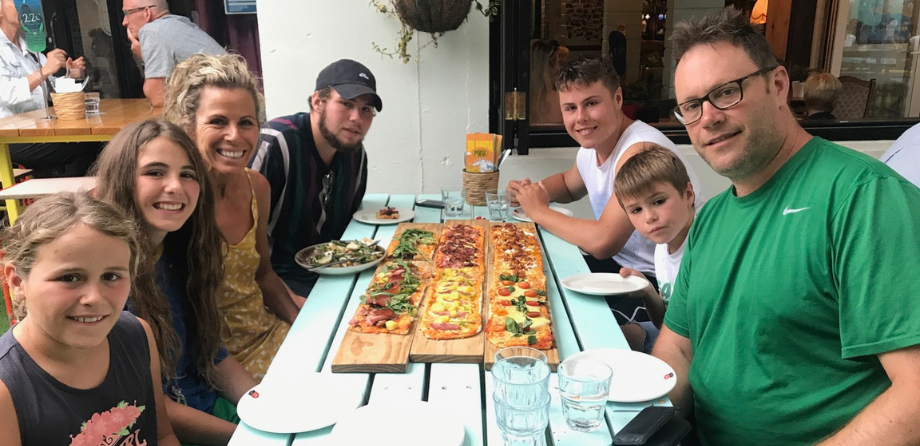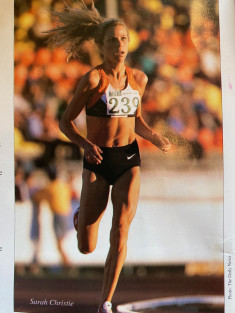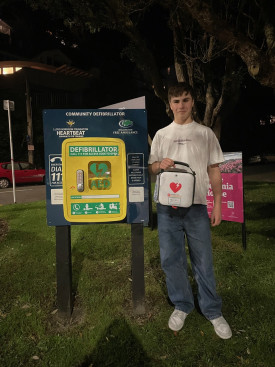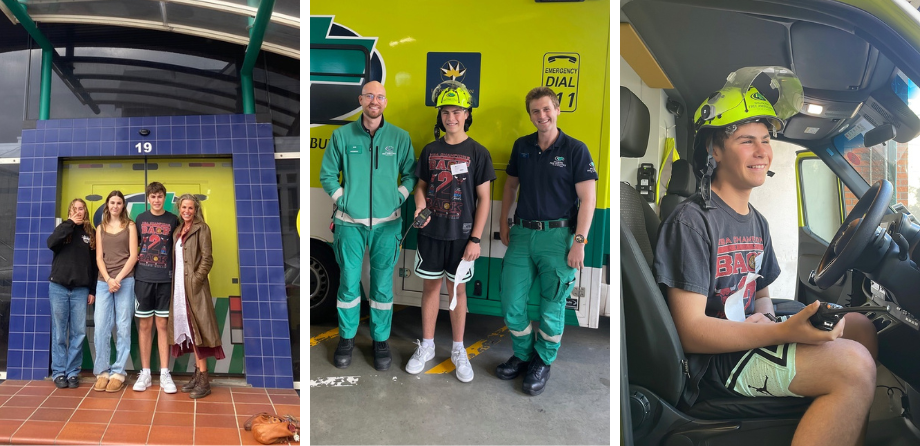About us
Our news
Sarah’s story – “Both times, the paramedics were incredible – I can’t fault them at all”
Sarah’s story – “Both times, the paramedics were incredible – I can’t fault them at all”
 21 July 2025
21 July 2025
Sarah’s story – “Both times, the paramedics were incredible – I can’t fault them at all”
After experiencing not one but two heart-related incidents in quick succession and receiving expert care from Wellington Free Ambulance paramedics, Sarah’s son Paddy felt inspired to help others – by fundraising for an AED in their home suburb of Kelburn. Read on to find out more about Sarah’s experience, including with ‘incredible’ paramedics Roberta and Kerry, and how it resulted in potentially lifesaving community care thanks to Paddy.

It was 2am and Sarah had just woken up with chest pains. “It was like someone was standing on my chest,” Sarah recalls. “I couldn’t feel my arms. It was a funny sort of pain.”
Not knowing what to do, Sarah woke her husband, Matt, up. “He took one look at me and knew I wasn’t right. He rang 111 straightaway.”
As a busy mum of 5, Sarah’s priority was their 4 kids in the house – Paddy (11), Bridie (13), Anabelle (16) and Baker (20). Boston (23) was away on the Gold Coast.
It was thoughts of her children that led Sarah to “get out of bed, get dressed and walk up our path to meet the ambulance. I didn’t want to wake the kids up” - even though she was in “quite a lot of pain”.
Expert help arrives
Two Wellington Free Ambulance paramedics, Roberta and Kerry, quickly arrived who were “absolutely phenomenal”, Sarah says. “It’s like they knew straightaway what was happening to me. They were so kind and stayed with me in the ambulance for what felt like ages, stabilising me before taking me to hospital.”
Although this time is mainly a ‘blur’ for Sarah, she remembers thinking ‘what’s happening to me?’ and feeling an “overwhelming panic”. Seeing her husband standing at the foot of the stretcher in the ambulance, Sarah was overcome with the need to tell her husband “make sure the kids know how much I love them”.
Paramedic Kerry takes up the story, explaining: “Roberta and I work very well as a team. A big thing for Sarah was trying to calm her anxiety. We spent time communicating with her to ease her as much as possible.
Waking with chest pain would be a very scary event and to suddenly be in an ambulance would be overwhelming! I remember talking with her husband and telling her he would be with the kids and not to worry. Just to focus on herself for the moment.
As much as the medical side is so important, I’m a big believer in building rapport and chatting with patients to help them feel as comfortable as possible.”
With Sarah stabilised for now, Roberta and Kerry took her to Wellington Hospital Emergency Department where she collapsed.
She woke up a few hours later to a doctor crouching by her bedside in the resus ward [resuscitation area].
She’d had a heart attack.
Finding out what happened
 In the lead up to her heart attack, there were no warning signs. Sarah had been feeling great and had no health issues – it simply “happened out of the blue”. In fact, Sarah ran for New Zealand for about 10 years, even reaching the Olympics qualifying standard for the 10,000 metres.
In the lead up to her heart attack, there were no warning signs. Sarah had been feeling great and had no health issues – it simply “happened out of the blue”. In fact, Sarah ran for New Zealand for about 10 years, even reaching the Olympics qualifying standard for the 10,000 metres.
While Sarah had ovarian cancer about 12 years ago, she was “relatively fit and healthy” – and had “never had to think about my heart health”. Although she naturally had low blood pressure, it was never a problem, and she wasn’t on any medication for it.
Which is why a heart attack was so surprising. Looking back, Sarah thinks with the symptoms she was experiencing, she would “never have picked a heart attack”.
It turns out Sarah had a SCAD - spontaneous coronary artery dissection. This happens when blood flow in the heart slows or stops because of a tear in the wall of an artery. It’s rare but life-threatening and the reduction in blood flow can cause a heart attack.
Sarah spent a week in hospital where she underwent an angiogram. Dye was inserted into the arteries of her heart to help locate the tear and measure its size. To restore full blood flow to Sarah’s heart, she was put on medication "so much medication!”, Sarah laughs. These medications helped Sarah’s heart to rest and heal, allowing her to be sent home to continue her recovery.
Needing Wellington Free – again
The day after leaving hospital, it was daughter Anabelle’s birthday party and Sarah was determined to go to the mall for a present. She’d only just got there with husband Matt and 11-year-old Paddy when Sarah said “I don’t feel so good” – and she collapsed in Paddy’s arms.
Due to the public setting of her collapse, Sarah and Paddy were soon surrounded by people wanting to help. Sarah remembers a pharmacist running out and Paddy telling him to ring 111.
Wellington Free paramedics soon arrived. What stands out for Sarah is how “kind they were, at a time when everyone around you is panicking and thinking ‘mum’s had a heart attack again – is she going to die?’” This included taking time to look after Paddy, inviting him to sit in the front of the ambulance while the other paramedic took care of Sarah in the back.
This time, the meds Sarah was on to heal the SCAD (spontaneous coronary artery dissection), had caused her already low blood pressure to drop further, causing her to faint. Having stabilised her on scene, Sarah was transported to Hutt Hospital where her medication was adjusted.
Lifesaving community care

It was Sarah’s experiences that led Paddy to develop an interest in paramedicine, CPR courses and AEDs [Automated External Defibrillator - a device that analyses the heart’s rhythm and, if necessary, delivers an electric shock to help the heart get back to its natural rhythm].
Sarah explains that “Paddy made us all do a CPR course and discovered an AED app [AED Locations]. He found that the nearest AED to our home in Kelburn was 10 minutes away – Paddy thought that was too far and wouldn’t be able to save anyone’s life.”
So began Paddy’s project – to fundraise for another 24/7 community access AED in Kelburn. Sarah realised that Kelburn had a “school, pub, cafes and wine bar. Lots of people come through”, making Kelburn a great spot for an AED.
Through Paddy’s research, he found that Wellington Free sells AEDs and he reached out to Rachel, manager of The Lloyd Morrison Foundation Heartbeat CPR training programme.
He had questions – how much does an AED cost? Where could one be installed? What were the cabinetry options?
Sarah says that Rachel was “fantastic, so encouraging and supportive”.
Thanks to Rachel’s emails, Paddy learnt his fundraising target: $4,000. Sarah was keen to impress upon Paddy that if he wanted to fundraise for an AED, he needed to organise it himself – and he really stepped up to reach that goal.
Paddy’s fundraising included speeches at the local school, approaching people he knew, setting up a Give a Little page and speaking to the community about what he was trying to do. According to Sarah, “he was going to persevere with his fundraising. He was determined to get an AED to help save lives”.
It took him a year to raise the $4,000 needed to buy and install Kelburn’s latest AED, realised with Rachel and Wellington Free Ambulance’s help.
Paddy dug the holes himself for the AED installation and painted the wooden cabinetry. He’s even reported an issue to the City Council – he’s worried tree branches are blocking a streetlight, making the area around the AED too dark!
The ‘silver lining’

Sarah feels “blown away” by Paddy’s dedication to fundraising for a new AED. He’s now equally determined to be a paramedic.
When Paddy turned 13, there’s just one thing he wanted to do – visit an ambulance station. Paddy, Sarah and his two sisters Bridie and Anabelle came to our Thorndon Ambulance Station where Wellington Community Liaison Nick showed them around, demonstrating everything from “sirens and walkie talkies to codes”.
Sarah believes that this is a real ‘silver lining’ to what happened to her - "Paddy being inspired to do something so incredible, both fundraising for an AED and wanting to become a paramedic himself”.
Reflecting on her Wellington Free Ambulance experience, Sarah can’t praise the paramedics enough.
“At a time when I felt so vulnerable and panicked, the paramedics came quickly and took over, knowing exactly what to do.”
“They spent so much time with me, making sure I was stabilised before moving me. They managed my pain and were so reassuring. They were understanding of my husband and my children in my time of need.”
“Both times, the paramedics were incredible – I can’t fault them at all.”
Paramedic Roberta who attended Sarah’s first incident remembers Sarah, especially “her walking up to meet us on the roadside as she didn’t want to alert the kids”. She says:
“Kerry and I work super well as a team and it's nice that patients can sense that when we arrive! A lot of our job is providing reassurance, a sense of calm, a safe place and keeping the patient well informed, understanding their needs (especially keeping family informed and reassured) - and how we can help to manage any anxiety that may be associated.
Being in the back of an ambulance when you are your most vulnerable is very overwhelming. I’m glad we were able to reassure her and her family, while providing a high standard of clinical care.”
If you’d like to be like Paddy, you can book a Heartbeat CPR training session, free of charge, today or find out more about the AEDs we sell. Or support our paramedics like Roberta and Kerry to keep saving and changing lives every day by donating.